2017高考专题:短文改错单句练习(冠词、介词、名词、缺词)
文档属性
| 名称 | 2017高考专题:短文改错单句练习(冠词、介词、名词、缺词) |

|
|
| 格式 | zip | ||
| 文件大小 | 73.9KB | ||
| 资源类型 | 教案 | ||
| 版本资源 | 通用版 | ||
| 科目 | 英语 | ||
| 更新时间 | 2019-01-08 00:00:00 | ||
图片预览


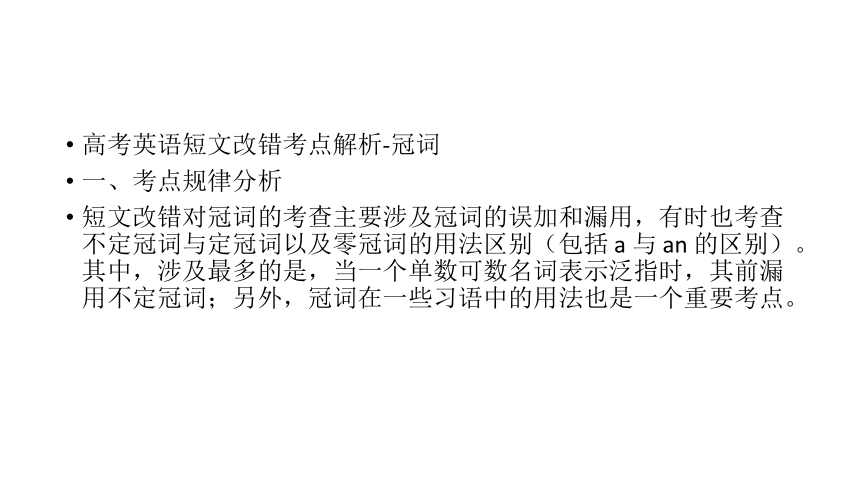
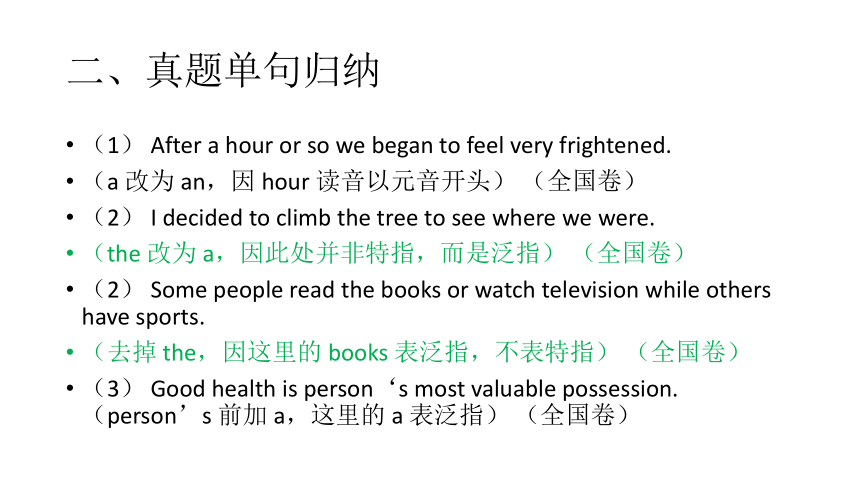
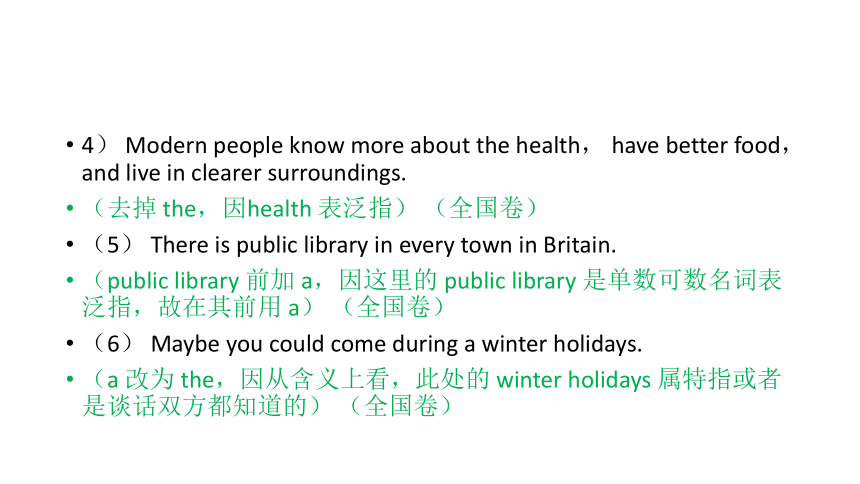
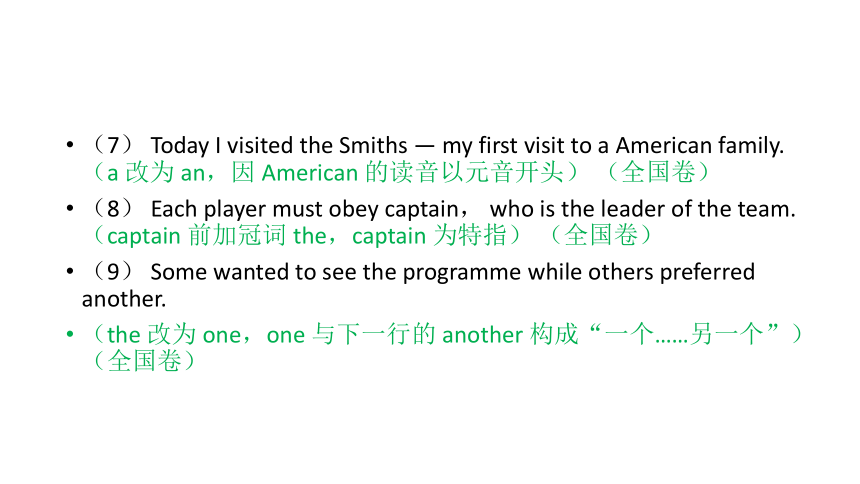

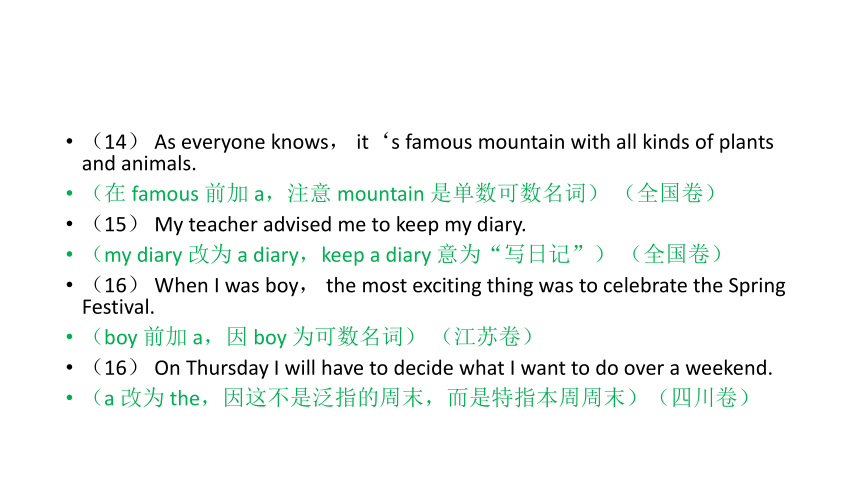

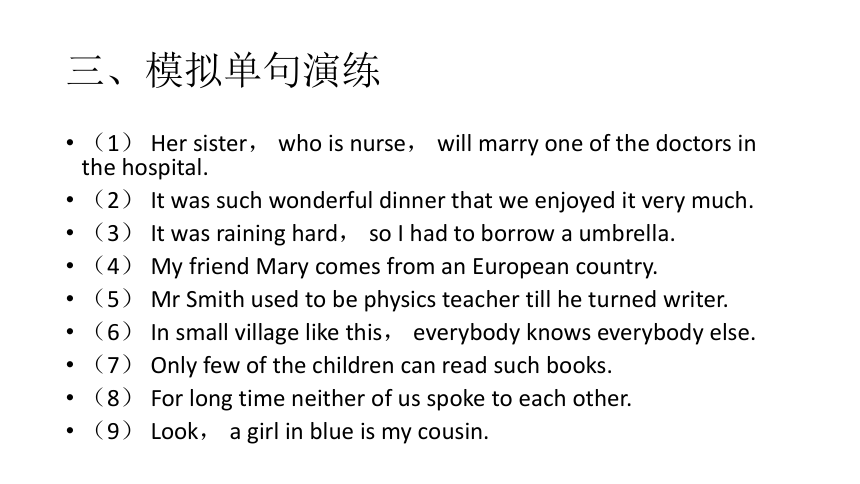
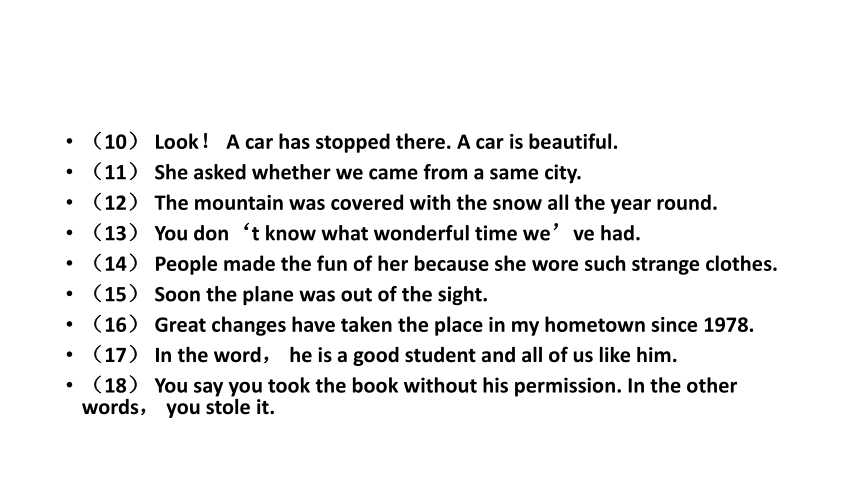
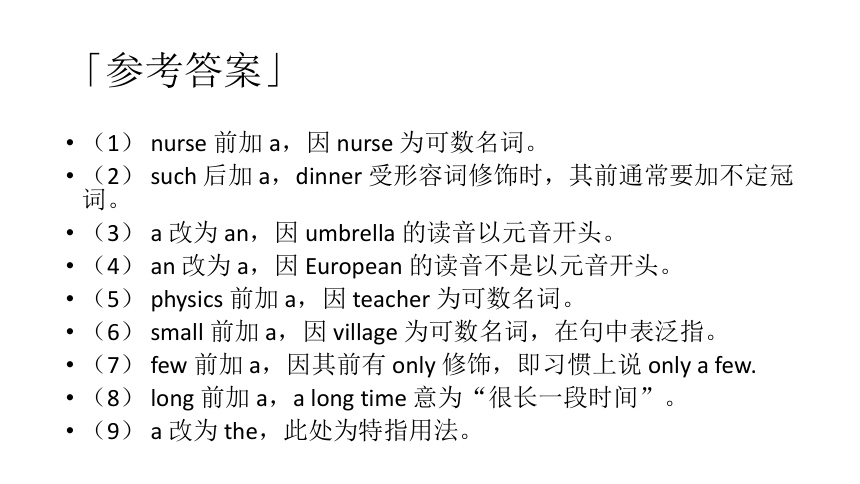
文档简介
课件50张PPT。高考英语短文改错考点解析及突破训练针对基础差的学生短期提高的解决方案
解析短文改错的高频考点并进行突破训练
让低起点的学生重拾信心,拾阶而上
为高考英语的成功赢得重要一局
高考英语短文改错考点解析-冠词
一、考点规律分析
短文改错对冠词的考查主要涉及冠词的误加和漏用,有时也考查不定冠词与定冠词以及零冠词的用法区别(包括 a 与 an 的区别)。其中,涉及最多的是,当一个单数可数名词表示泛指时,其前漏用不定冠词;另外,冠词在一些习语中的用法也是一个重要考点。二、真题单句归纳(1) After a hour or so we began to feel very frightened.
(a 改为 an,因 hour 读音以元音开头) (全国卷)
(2) I decided to climb the tree to see where we were.
(the 改为 a,因此处并非特指,而是泛指) (全国卷)
(2) Some people read the books or watch television while others have sports.
(去掉 the,因这里的 books 表泛指,不表特指) (全国卷)
(3) Good health is person‘s most valuable possession. (person’s 前加 a,这里的 a 表泛指) (全国卷)4) Modern people know more about the health, have better food, and live in clearer surroundings.
(去掉 the,因health 表泛指) (全国卷)
(5) There is public library in every town in Britain.
(public library 前加 a,因这里的 public library 是单数可数名词表泛指,故在其前用 a) (全国卷)
(6) Maybe you could come during a winter holidays.
(a 改为 the,因从含义上看,此处的 winter holidays 属特指或者是谈话双方都知道的) (全国卷)(7) Today I visited the Smiths — my first visit to a American family. (a 改为 an,因 American 的读音以元音开头) (全国卷)
(8) Each player must obey captain, who is the leader of the team. (captain 前加冠词 the,captain 为特指) (全国卷)
(9) Some wanted to see the programme while others preferred another.
(the 改为 one,one 与下一行的 another 构成“一个……另一个”) (全国卷)(10) I‘ll take this chance to wish you wonderful time on your birthday.
(wonderful 前加 a,该表达与 have a good time 类似,其中的 a 不可省) (北京春季卷)
(11) Suddenly, I caught a sight of my English teacher in the crowd.
(去掉 a,catch sight of 是习语,意为“看见、瞥见”) (全国卷)
(12) For example, when I was a child, the rain was a mystery(奥秘)。 (去掉 the,rain 在此泛指) (北京春季卷)
(13) We may be one family and live under a same roof.
(a 改为 the,因 same 前应用定冠词) (全国卷)(14) As everyone knows, it‘s famous mountain with all kinds of plants and animals.
(在 famous 前加 a,注意 mountain 是单数可数名词) (全国卷)
(15) My teacher advised me to keep my diary.
(my diary 改为 a diary,keep a diary 意为“写日记”) (全国卷)
(16) When I was boy, the most exciting thing was to celebrate the Spring Festival.
(boy 前加 a,因 boy 为可数名词) (江苏卷)
(16) On Thursday I will have to decide what I want to do over a weekend.
(a 改为 the,因这不是泛指的周末,而是特指本周周末)(四川卷)(17) And every year more and more people start a stamp collection of their own and discover an interest which can even last lifetime.
(lifetime 前加a,指人的一生是 a lifetime) (浙江卷)
(18) Ten minutes later, the firemen came and put out fire.
(fire 前加 the,因这是特指的一场火灾) (福建卷)
(19) As we all left home at early age,…
(early前加an,at an early age意为“在年幼时”) (天津卷)
(20) My grandma was the best cooker in the world but could make the most delicious dishes.
(cooker 改为cook,比较:cook=炊事员,cooker=炊具) (江苏卷) 三、模拟单句演练(1) Her sister, who is nurse, will marry one of the doctors in the hospital.
(2) It was such wonderful dinner that we enjoyed it very much.
(3) It was raining hard, so I had to borrow a umbrella.
(4) My friend Mary comes from an European country.
(5) Mr Smith used to be physics teacher till he turned writer.
(6) In small village like this, everybody knows everybody else.
(7) Only few of the children can read such books.
(8) For long time neither of us spoke to each other.
(9) Look, a girl in blue is my cousin.(10) Look! A car has stopped there. A car is beautiful.
(11) She asked whether we came from a same city.
(12) The mountain was covered with the snow all the year round.
(13) You don‘t know what wonderful time we’ve had.
(14) People made the fun of her because she wore such strange clothes.
(15) Soon the plane was out of the sight.
(16) Great changes have taken the place in my hometown since 1978.
(17) In the word, he is a good student and all of us like him.
(18) You say you took the book without his permission. In the other words, you stole it.
「参考答案」(1) nurse 前加 a,因 nurse 为可数名词。
(2) such 后加 a,dinner 受形容词修饰时,其前通常要加不定冠词。
(3) a 改为 an,因 umbrella 的读音以元音开头。
(4) an 改为 a,因 European 的读音不是以元音开头。
(5) physics 前加 a,因 teacher 为可数名词。
(6) small 前加 a,因 village 为可数名词,在句中表泛指。
(7) few 前加 a,因其前有 only 修饰,即习惯上说 only a few.
(8) long 前加 a,a long time 意为“很长一段时间”。
(9) a 改为 the,此处为特指用法。(10) 第二个 A 改为 The,特指前面已提到的事物。
(11) a 改为 the,因 same 前习惯上用定冠词,不用不定冠词。
(12) 去掉 the,在此 snow 为泛指用法。
(13) wonderful 前加 a,因 have a wonderful time 为习惯表达。
(14) 去掉 the,因 make fun of 为习语,意为“取笑”。
(15) 去掉 the,因 out of sight 为习语,意为“看不见”。
(16) 去掉 the,因 take place为习语,意为“发生”。
(17) the 改为 a,因 in a word 为习语,意为“总之”、“一句话”。
(18) 去掉 the,因 in other words 为习语,意为“换句话说” 高考英语短文改错考点解析-介词
一、考点规律分析
短文改错对介词的考查主要涉及在及物动词后接宾语时误加介词和在不及物动词后接宾语时漏加介词、可直接用作状语的副词短语前误加介词、介词与其他词的常用搭配、常用介词的基本用法、习语中的介词用法等。二、真题单句归纳(1) Bill insisted in staying near the car.
(in 改为 on,insist on 为固定搭配) (全国卷)
(2) Suddenly we caught sight at a car and some men.
(at 改为 of,catch sight of是习语,意为“看见”) (全国卷)
(3) When I have free time I go a long walk.
(go 后加 for,go for a walk 是习语) (全国卷)
(4) When they came down the police were angry to them.
(to 改为 with,要表示对某人生气,英语习惯上用be angry with sb)
(5) Most people can quickly get for help from a doctor or go to a hospital since they are ill.
(去掉 for,因其前的 get 是及物动词) (全国卷)(6) …and some books, for example, books for history, science, cooking and gardening are also popular.
(books for 改为 books on,此处的 on 意为“关于”)
(7) I never knew about a ride down a river could be so exciting.
(去掉 about 或将 about 改为 that,
(8) It was very kind for them to meet me at the railway station.
(for 改为 of,注意句型 It‘s kind of sb to do sth) (全国卷)
(9) In fact, they are planning to visit China in next year.
(去掉 in,在由 next, this, last 等构成的时间短语中,无需加 in, on, at 这样的介词)
(10) We practise for three times every week.
(去掉 for,在表示频率的名词前通常不加介词) (全国卷)(11) We must keep in mind that we play for the team instead ourselves.
(instead 后加 of,instead of 为复合介词,在此表示“而不是”) (全国卷)
(12) Unfortunately, there are too many people among my family. (among 改为 in,in my family 意为“在我家里”) (全国卷)
(13) I was happy with any programme but the others spent a lot time arguing…
(a lot 后加 of,因 a lot 不能直接修饰名词) (全国卷)
(14) Thanks very much on inviting me to your birthday party on Sunday. (on 改为 for,thanks for doing sth 意为“因某事而感谢某人”) (北京春季卷)(15) So I‘m really sorry that?? I won’t be able to come in this time.
(去掉 in,因 this time 可直接用作状语) (北京春季卷)
(16) …but we do not seem to get much time to talk about together.
(去掉 about,因 about 后没有接宾语,about 属多余)
(17) For instance, on one night he played strong and loud music till four o‘clock in the morning.
(去掉 on,因 one night 可直接用作状语) (北京春季卷)
(18) I was so tired that I fell asleep at the moment my head touched the pillow.
(去掉 at,the moment 在此用作连词,相当于 as soon as) (全国卷)(19) His parents asked him to spend in more time preparing for the college entrance examination.
(去掉 in,spend 是及物动词,其后可直接跟名词作宾语) (安徽春季卷)
(20) I feel sorry to him.
(to 改为 for,be / feel sorry for sb 意为“为某人感到难过”) (安徽春季卷)
(21) Because so much viewing, children may not develop the habit of reading and the ability to enjoy themselves.
(Because 后加 of,因 so much viewing 相当于名词) (北京春季卷)
(22) On one year the average child will see 25,000 television commercials…
(On 改为 In,意为“在一年中”) (北京春季卷)(23) The main problem was in that I always thought in Chinese… (去掉 that 前的 in,was 后是一个以 that 引导的宾语从句,in 是多余的) (全国卷)
(24) I‘m sure they will laugh to me and see me as?? a fool. So I feel unhappy every day.
(to 改为 at,laugh at 意为“嘲笑”) (全国卷)
(25) You can find all kinds information in just a few minutes on the Internet.
(kinds 后加 of,a kind of 意为“一种……”,all kinds of…意为“各种各样的……”) (广西卷)(26) But I have spent lots my money, …
(lots后加of,lots / a lot后不能接名词;后接名词时,要用lots of…,a lot of…) (四川卷)
(27) …you will probably want to join in the Stamp Collectors‘ Club…
(去掉 in,表示“参加,加入”某个组织,join 后不要再加介词 in;表示“参加”某项活动时,才加 in) (浙江卷)
(28) We have a lot on common and have a lot to talk about.
(on 改为 in,因为 have sth in common 是固定搭配,意为“有共同的……”) (福建卷)三、模拟单句演练(1) We must serve for the people heart and soul.
(2) I followed the man for a while, and saw him enter into the bank.
(3) Soon the nurse married with my friend Jim.
(4) I took a great many of photographs in the mountains.
(5) In English class, we often talk each other in English.
(6) Don‘t talk. What the man says is well worth listening.(7) The chair looks hard, but it is comfortable to sit.
(8) She was very kind and insisted lending her car to us.
(9) I asked to her what she would be doing on Saturday.
(10) Are you glad to be going to back to school?
(11) On his way to home, he met one of his old friends Jack.
(12) Please close the door at next time you come in.(13) Thousands of people go to the seaside in every year.
(14) We can finish the work either this week or in next week.
(15) We walked down the stairs instead taking the elevator.
(16) We could not have heard them because the noise from the river.
(17) Don‘t be angry to me for not having written—I was really too busy.
(18) I‘ve read a lot books about animals.(19) He invited us to dinner, which was very kind for him.
(20) I knew that there was no hope on the moment I saw him.
(21) Don‘t go by plane. It’s a lot of more expensive.
(22) Except milk and cheese, we all need vegetables.
(23) On my way back, I called at Mr Smith at his office.
「参考答案」(1) 去掉 for,serve 表示“为……服务”,是及物动词,后接宾语时无需用介词。
(2) 去掉 into,enter 表示“进入”时,是及物动词,后接宾语时无需用介词。
(3) 去掉 with,marry 表示“与……结婚”时,是及物动词,后接宾语时无需用介词。
(4) 去掉 of,a great many后可直接跟名词,无需用介词。但若其后的名词有the, these, my 等表特指的限定词,则要用介词 of,如 a great many of my friends.
(5) talk 后加 to,因 talk 为不及物动词。
(6) listening 后加 to,因what the man says 是 listen to 的逻辑宾语。
(7) sit 后加 on或 in,因为从逻辑上说就是 sit on/in the chair.
(8) insisted 后加 on,insist 后可接从句作宾语,但不接名词、代词、动名词等作宾语,遇此情况应用 insist on. (9) 去掉 to,因 ask 是及物动词,后接宾语时无需用介词。
(10) 去掉 back 前的 to,因 back 是副词,其前不用介词。
(11) 去掉 home 前的 to,因 home 是副词,其前不用介词。
(12) 去掉 at,因 next time 在此用作连词,意为“下次”。
(13) 去掉 in,every year 可直接用作状语,其前无需用介词。
(14) 去掉 in,next week 可直接用作状语,其前无需用介词。
(15) instead 后加 of,instead of 为复合介词,在此表示“而没有”。
(16) because 后加 of,因其后接的是名词,而不是句子。
(17) to 改为 with,要表示“对某人生气”,用 be angry with sb,不用 be angry to sb.(18) a lot 后加 of,a lot of 意为“许多”。
(19) for 改为 of,为 it is very kind of sb 的变体。
(20) 去掉 on,the moment 在此用作连词,意为“一……就”。
(21) 去掉 of,a lot 修饰比较级,a lot of 修饰名词。
(22) Except 改为Besides.比较:except 表示“除……外,不再有”,besides 表示“除……外,还有”。
(23) at 改为 on.比较:call at 后接某地方,call on 后接某人
高考英语短文改错考点解析-名词
一、考点规律分析
短文改错的名词考点主要涉及名词的单复数问题,即在该用复数的地方误用其单数,或在该用单数的地方误用其复数。二、真题单句归纳(1) We stopped to rest for a while and to drink some waters from a stream.
(waters 改为water,因“水”为物质名词,不可数)
(2) We climb everywhere, not only in America. We have been to Europe many time.
(time改为 times,many times 意为“许多次”)
(3) There are branch library in many villages.
(library 改为 libraries,因其前的谓语are为复数)
(4) I hope that you two could come and visit us some times soon. (times 改为 time,some time 意为“某时”) (全国卷)(5) Today I visited the Smiths — my first time visit to an American family.
(去掉time,因first 已含有“次”的意思) (全国卷)
(6) They were eager to know everything about China and asked me lots of question.
(question 改为 questions,
(7) We study quite a few subject, such as maths, Chinese, English and physics.
(subject 改为 subjects,因 a few 后应接复数可数名词) (全国卷)
(8) …and often watch football match on TV together.
(match 改为 matches) (全国卷)(9) Happy birthday, Peter, and many happy return of the day! (return改为 returns,many happy returns of the day! 为祝贺生日的惯用表达) (北京春季卷)
(10) She said that she and my schoolmate all wished me success. (schoolmate 改为 schoolmates,因校友不只一个,另外根据其后的 all 也可推知) (全国卷)
(11) I used to love science class — all of them— biology, chemistry, geography, physics.
(class 改为 classes,指其后提到的所有课程) (北京春季卷)
(12) They did not want me to do any work at family.
(family 改为 home,因 at home 为固定短语) (全国卷)(13) …so that I‘ll get good marks in all my subject.
(subject 改为 subjects,请注意前面的 all) (全国卷)
(14) On the way up I was busy taking picture since the scenery was so beautiful.
(picture 改为 pictures,
(15) No one worries much about the radio program young people listen to.
(program 改为 programs,从句意上看,此处应用复数)
(16) Their word were a great encouragement to me.
(word 改为 words,注意其后的复数动词) (全国卷)(17) You know, that was a dinner we had waited for several month.“
(month 改为 months,因 several 后要用可数名词的复数形式) (江苏卷)
(18) …but after class we become stranger at?? once.
(stranger改为strangers,由本行前面的we可知应该用名词复数) (全国卷)
(19) You can find all kinds of information in just a few minute on the Internet.
(minute改为minutes,因为a few后面的名词一定是复数) (广西卷)(20) Nowadays millions of people of all age take pleasure in a hobby…
(age改为ages,因谈到不止一个人的年龄,age用复数;of all ages指各个年龄阶段的人 (浙江卷)
(21) She was doing her homeworks one Sunday morning when… (homeworks改为homework,因它是不可数名词,没有复数形式) (福建卷)
(22) Without enough knowledges,?? you can never teach well. (knowledges改为knowledge,因 knowledge是不可数名词,没有复数形式) (湖北卷)三、模拟单句演练(1) Women live longer than men in most country.
(2) The film is very interesting. I have seen it many time.
(3) It‘s said that all the ticket have been sold out.
(4) The children spend a lot of times watching TV.
(5) I met a lot of interesting peoples on holiday.
(6) The flower in the park were all pleasing.
(7) As the day went by, she became less anxious. (8) Computer are becoming more and more popular in the country.
(9) It‘s one of the most interesting book that I’ve ever read.
(10) He made his first time visit to China when he was 18.
(11) Hearing the news, the woman burst into tear.
(12) He hasn‘t lived here long, but he has a great many friend here.
(13) I was afraid she would have left for family when I got there.
(14) He‘s getting married next month and decides to buy some furnitures.
(15) There‘s a paper’s factory near our school. 「参考答案」
(1) country 改为 countries,因其前的most 意为“大多数”。
(2) time 改为 times,many times 意为“许多次”。
(3) ticket 改为 tickets,因它是可数名词,且受 all the 的修饰。
(4) times 改为 time,因 time 表示“时间”时不可数。
(5) peoples 改为 people,因 people 表示“人们”,本身是复数,其后不能再加词尾-s.(注:复数的peoples 表示不同的民族)
(6) flower 改为 flowers,因为其后的谓语为复数。
(7) day 改为 days,句意为“随着时间的推移,她变得不那么焦急了”,此处的 day 应用复数。(8) computer 改为 computers,根据句意和其后的谓语 are,可知 computer 要用复数。
(9) book 改为 books,因 one of 后表示范围的名词要用复数。
(10) 去掉 time,his first visit 即为他第一次访问,其中已包含“次”的概念。
(11) tear 改为 tears,因 tear 为可数名词,不要误认为它是不可数名词。
(12) friend 改为 friends,因a great many 后要接复数名词。
(13) family 改为 home,leave for home 意为“动身回家”。
(14) furnitures 改为 furniutre,因它是不可数名词。
(15) paper‘s 改为 paper,表示“纸厂”、“纸花”、“纸飞机”等,直接用 paper 作定语
高考英语短文改错考点解析-缺词
一、考点规律分析
与多词错误的情形相似,缺词也主要涉及英语中一些“小”词,如冠词、介词、不定式符号、人称代词、动词 be等。具体说来,漏词错误可能涉及的问题有:不及物动词后接宾语时漏加必要的介词,在该带不定式符号to的地方漏加 to,在单数可数名词表示泛指意义时漏加必要的限定词(尤其是漏加不定冠词),漏掉表特指的定冠词,漏掉被动语态中的助动词 be,漏加系表结构中的连系动词 be,漏加一些常用结构或表达中的介词(如漏掉 a lot of 中的 of,漏掉 because of 中的 of,漏掉 instead of 中的 of等),漏掉某些从句的“引导词”(通常会导致意义不通),等等。二、真题单句归纳(1) When we walked to the car, Bill smiled and shook head. (head 前加 his,汉语可“摇头”,而按英语的习惯要说 shake one‘s head) (全国卷)
(2) When I have free time I go a long walk.
(go 后加 for,go for a walk 是习语) (全国卷)
(3) Charles said, “As soon I see a realy tall building, I want to climb it.
(第一个I 前加 as,因为 as soon as 为引导时间状语从句的引导词)(全国卷)
(4) Good health is person‘s most valuable possession. (person’s 前加 a,这里的 a 表泛指) (全国卷)(5) The World Health Organization and?? other organizations are working improve health all over the world.
(improve前加 to,to improve…为表目的的不定式短语) (全国卷)
(6) There is public library in every town in Britain.
(public library 前加 a,因这里的 public library 是单数可数名词表泛指,故在其前用 a) (全国卷)
(7) In some places you may borrow many books as you want.
(many 之前加 as,因此处为as …… as 结构) (全国卷)
(8) …and let you know when the book you want has returned.
(returned 之前加 been,因从句意上看,此处用被动语态) (全国卷)(9) I had always wanted return to the village after moving away.
(return前加 to,因为 want 后要接不定式)
(10) I told Mother, Father, Sister, all my friends here what a great time I had.
(all 前加 and,表示并列关系) (全国卷)
(11) They eager to know everything about China and asked me lots of questions.
(eager 前加were,因此处缺谓语动词) (全国卷)
(12) I‘d like to your pen-friend, and get to know more about your country.
(to 后加 be / become,因 would like 后接不定式,根据句意此处应补 be / become) (全国卷)(13) What your favourite sport?
(what 后加 is 或将 What 改为 What‘s,
(14) We must keep in mind that we play for the team instead ourselves.
(instead 后加 of,instead of 为复合介词,在此表示“而不是”) (全国卷)
(15) Each player must obey captain, who is the leader of the team.
(captain 前加冠词 the,captain 为特指) (全国卷)
(16) I was happy with any programme but the others spent a lot time arguing…
(a lot 后加 of,因 a lot 不能直接修饰名词) (全国卷)(17) I‘ll take this chance to wish you wonderful time on your birthday.
(wonderful 前加 a,该表达与 have a good time 类似
(18) I‘d like very much come but I had an examination on Monday morning.
(come 前加 to,因为 would like 后接不定式)
(19) The day before the speech contest(比赛) English teacher talked to me.
(English 前加 my,teacher 为单数可数名词,前面要限定词) (全国卷)
(20) In one class, I learned it rained.
(it 前加why,why 在此表原因) (北京春季卷)(21) But then there is always more mysteries look into.
(look 前加 to,此处为不定式作后置定语) (北京春季卷)
(22) My parents love me dearly of course and will do all they can make sure that I get a good education.
(make 前加 to,因为 to make… 在此用作目的状语,注意句型 do all one can to do sth) (全国卷)
(23) As everyone knows, it‘s famous mountain with all kinds of plants and animals.
(在 famous 前加 a,注意 mountain 是单数可数名词)
(24) It was about noon we arrived at the foot of the mountain. (we 前加 when,时间状语从句缺少连词引导) (全国卷)(25) There will an important game next month.
(will 后加be,此处缺谓语动词) (安徽春季卷)
(26) Because so much viewing, children may not develop the habit of reading and the ability to enjoy themselves.
(Because 后加 of,因 so much viewing 相当于名词) (北京春季卷)
(27) One day I wrote a little story and showed to my teacher. (showed 后加 it,showed 在此作及物动词,后面缺少宾语) (全国卷)(28) When I was boy, the most exciting thing was to celebrate the Spring Festival.
(boy 前加 a,因 boy 为可数名词) (江苏卷)
(29) You can find all kinds information in just a few minutes on the Internet.
(kinds 后加 of.all kinds of 意为“各种各样的”) (广西卷)
(30) …discover an interest which can even last lifetime.
(lifetime 前加 a,指人的一生是 a lifetime) (浙江卷)(31) She stopped look out of the window and find a cloud of smoke coming out of her neighbor‘s house.
(look 前加 to.因为“停下来去做某事”是 stop to do sth, 不定式作目的状语) (福建卷)
(32) Ten minutes later, the firemen came and put out fire.
(fire 前加 the,因这是特指的一场火灾) (福建卷)
(33) As we all left homeat early age, we met lots of problems in our daily life…
(early 前加 an,at an early age 意为“在年幼时”) (天津卷)(34) I often dream of a teacher. (a teacher 前加上 being 或 becoming,根据后文的内容看来,作者不是梦见老师,而是自己梦想“成为”一名教师) (湖北卷)
解析短文改错的高频考点并进行突破训练
让低起点的学生重拾信心,拾阶而上
为高考英语的成功赢得重要一局
高考英语短文改错考点解析-冠词
一、考点规律分析
短文改错对冠词的考查主要涉及冠词的误加和漏用,有时也考查不定冠词与定冠词以及零冠词的用法区别(包括 a 与 an 的区别)。其中,涉及最多的是,当一个单数可数名词表示泛指时,其前漏用不定冠词;另外,冠词在一些习语中的用法也是一个重要考点。二、真题单句归纳(1) After a hour or so we began to feel very frightened.
(a 改为 an,因 hour 读音以元音开头) (全国卷)
(2) I decided to climb the tree to see where we were.
(the 改为 a,因此处并非特指,而是泛指) (全国卷)
(2) Some people read the books or watch television while others have sports.
(去掉 the,因这里的 books 表泛指,不表特指) (全国卷)
(3) Good health is person‘s most valuable possession. (person’s 前加 a,这里的 a 表泛指) (全国卷)4) Modern people know more about the health, have better food, and live in clearer surroundings.
(去掉 the,因health 表泛指) (全国卷)
(5) There is public library in every town in Britain.
(public library 前加 a,因这里的 public library 是单数可数名词表泛指,故在其前用 a) (全国卷)
(6) Maybe you could come during a winter holidays.
(a 改为 the,因从含义上看,此处的 winter holidays 属特指或者是谈话双方都知道的) (全国卷)(7) Today I visited the Smiths — my first visit to a American family. (a 改为 an,因 American 的读音以元音开头) (全国卷)
(8) Each player must obey captain, who is the leader of the team. (captain 前加冠词 the,captain 为特指) (全国卷)
(9) Some wanted to see the programme while others preferred another.
(the 改为 one,one 与下一行的 another 构成“一个……另一个”) (全国卷)(10) I‘ll take this chance to wish you wonderful time on your birthday.
(wonderful 前加 a,该表达与 have a good time 类似,其中的 a 不可省) (北京春季卷)
(11) Suddenly, I caught a sight of my English teacher in the crowd.
(去掉 a,catch sight of 是习语,意为“看见、瞥见”) (全国卷)
(12) For example, when I was a child, the rain was a mystery(奥秘)。 (去掉 the,rain 在此泛指) (北京春季卷)
(13) We may be one family and live under a same roof.
(a 改为 the,因 same 前应用定冠词) (全国卷)(14) As everyone knows, it‘s famous mountain with all kinds of plants and animals.
(在 famous 前加 a,注意 mountain 是单数可数名词) (全国卷)
(15) My teacher advised me to keep my diary.
(my diary 改为 a diary,keep a diary 意为“写日记”) (全国卷)
(16) When I was boy, the most exciting thing was to celebrate the Spring Festival.
(boy 前加 a,因 boy 为可数名词) (江苏卷)
(16) On Thursday I will have to decide what I want to do over a weekend.
(a 改为 the,因这不是泛指的周末,而是特指本周周末)(四川卷)(17) And every year more and more people start a stamp collection of their own and discover an interest which can even last lifetime.
(lifetime 前加a,指人的一生是 a lifetime) (浙江卷)
(18) Ten minutes later, the firemen came and put out fire.
(fire 前加 the,因这是特指的一场火灾) (福建卷)
(19) As we all left home at early age,…
(early前加an,at an early age意为“在年幼时”) (天津卷)
(20) My grandma was the best cooker in the world but could make the most delicious dishes.
(cooker 改为cook,比较:cook=炊事员,cooker=炊具) (江苏卷) 三、模拟单句演练(1) Her sister, who is nurse, will marry one of the doctors in the hospital.
(2) It was such wonderful dinner that we enjoyed it very much.
(3) It was raining hard, so I had to borrow a umbrella.
(4) My friend Mary comes from an European country.
(5) Mr Smith used to be physics teacher till he turned writer.
(6) In small village like this, everybody knows everybody else.
(7) Only few of the children can read such books.
(8) For long time neither of us spoke to each other.
(9) Look, a girl in blue is my cousin.(10) Look! A car has stopped there. A car is beautiful.
(11) She asked whether we came from a same city.
(12) The mountain was covered with the snow all the year round.
(13) You don‘t know what wonderful time we’ve had.
(14) People made the fun of her because she wore such strange clothes.
(15) Soon the plane was out of the sight.
(16) Great changes have taken the place in my hometown since 1978.
(17) In the word, he is a good student and all of us like him.
(18) You say you took the book without his permission. In the other words, you stole it.
「参考答案」(1) nurse 前加 a,因 nurse 为可数名词。
(2) such 后加 a,dinner 受形容词修饰时,其前通常要加不定冠词。
(3) a 改为 an,因 umbrella 的读音以元音开头。
(4) an 改为 a,因 European 的读音不是以元音开头。
(5) physics 前加 a,因 teacher 为可数名词。
(6) small 前加 a,因 village 为可数名词,在句中表泛指。
(7) few 前加 a,因其前有 only 修饰,即习惯上说 only a few.
(8) long 前加 a,a long time 意为“很长一段时间”。
(9) a 改为 the,此处为特指用法。(10) 第二个 A 改为 The,特指前面已提到的事物。
(11) a 改为 the,因 same 前习惯上用定冠词,不用不定冠词。
(12) 去掉 the,在此 snow 为泛指用法。
(13) wonderful 前加 a,因 have a wonderful time 为习惯表达。
(14) 去掉 the,因 make fun of 为习语,意为“取笑”。
(15) 去掉 the,因 out of sight 为习语,意为“看不见”。
(16) 去掉 the,因 take place为习语,意为“发生”。
(17) the 改为 a,因 in a word 为习语,意为“总之”、“一句话”。
(18) 去掉 the,因 in other words 为习语,意为“换句话说” 高考英语短文改错考点解析-介词
一、考点规律分析
短文改错对介词的考查主要涉及在及物动词后接宾语时误加介词和在不及物动词后接宾语时漏加介词、可直接用作状语的副词短语前误加介词、介词与其他词的常用搭配、常用介词的基本用法、习语中的介词用法等。二、真题单句归纳(1) Bill insisted in staying near the car.
(in 改为 on,insist on 为固定搭配) (全国卷)
(2) Suddenly we caught sight at a car and some men.
(at 改为 of,catch sight of是习语,意为“看见”) (全国卷)
(3) When I have free time I go a long walk.
(go 后加 for,go for a walk 是习语) (全国卷)
(4) When they came down the police were angry to them.
(to 改为 with,要表示对某人生气,英语习惯上用be angry with sb)
(5) Most people can quickly get for help from a doctor or go to a hospital since they are ill.
(去掉 for,因其前的 get 是及物动词) (全国卷)(6) …and some books, for example, books for history, science, cooking and gardening are also popular.
(books for 改为 books on,此处的 on 意为“关于”)
(7) I never knew about a ride down a river could be so exciting.
(去掉 about 或将 about 改为 that,
(8) It was very kind for them to meet me at the railway station.
(for 改为 of,注意句型 It‘s kind of sb to do sth) (全国卷)
(9) In fact, they are planning to visit China in next year.
(去掉 in,在由 next, this, last 等构成的时间短语中,无需加 in, on, at 这样的介词)
(10) We practise for three times every week.
(去掉 for,在表示频率的名词前通常不加介词) (全国卷)(11) We must keep in mind that we play for the team instead ourselves.
(instead 后加 of,instead of 为复合介词,在此表示“而不是”) (全国卷)
(12) Unfortunately, there are too many people among my family. (among 改为 in,in my family 意为“在我家里”) (全国卷)
(13) I was happy with any programme but the others spent a lot time arguing…
(a lot 后加 of,因 a lot 不能直接修饰名词) (全国卷)
(14) Thanks very much on inviting me to your birthday party on Sunday. (on 改为 for,thanks for doing sth 意为“因某事而感谢某人”) (北京春季卷)(15) So I‘m really sorry that?? I won’t be able to come in this time.
(去掉 in,因 this time 可直接用作状语) (北京春季卷)
(16) …but we do not seem to get much time to talk about together.
(去掉 about,因 about 后没有接宾语,about 属多余)
(17) For instance, on one night he played strong and loud music till four o‘clock in the morning.
(去掉 on,因 one night 可直接用作状语) (北京春季卷)
(18) I was so tired that I fell asleep at the moment my head touched the pillow.
(去掉 at,the moment 在此用作连词,相当于 as soon as) (全国卷)(19) His parents asked him to spend in more time preparing for the college entrance examination.
(去掉 in,spend 是及物动词,其后可直接跟名词作宾语) (安徽春季卷)
(20) I feel sorry to him.
(to 改为 for,be / feel sorry for sb 意为“为某人感到难过”) (安徽春季卷)
(21) Because so much viewing, children may not develop the habit of reading and the ability to enjoy themselves.
(Because 后加 of,因 so much viewing 相当于名词) (北京春季卷)
(22) On one year the average child will see 25,000 television commercials…
(On 改为 In,意为“在一年中”) (北京春季卷)(23) The main problem was in that I always thought in Chinese… (去掉 that 前的 in,was 后是一个以 that 引导的宾语从句,in 是多余的) (全国卷)
(24) I‘m sure they will laugh to me and see me as?? a fool. So I feel unhappy every day.
(to 改为 at,laugh at 意为“嘲笑”) (全国卷)
(25) You can find all kinds information in just a few minutes on the Internet.
(kinds 后加 of,a kind of 意为“一种……”,all kinds of…意为“各种各样的……”) (广西卷)(26) But I have spent lots my money, …
(lots后加of,lots / a lot后不能接名词;后接名词时,要用lots of…,a lot of…) (四川卷)
(27) …you will probably want to join in the Stamp Collectors‘ Club…
(去掉 in,表示“参加,加入”某个组织,join 后不要再加介词 in;表示“参加”某项活动时,才加 in) (浙江卷)
(28) We have a lot on common and have a lot to talk about.
(on 改为 in,因为 have sth in common 是固定搭配,意为“有共同的……”) (福建卷)三、模拟单句演练(1) We must serve for the people heart and soul.
(2) I followed the man for a while, and saw him enter into the bank.
(3) Soon the nurse married with my friend Jim.
(4) I took a great many of photographs in the mountains.
(5) In English class, we often talk each other in English.
(6) Don‘t talk. What the man says is well worth listening.(7) The chair looks hard, but it is comfortable to sit.
(8) She was very kind and insisted lending her car to us.
(9) I asked to her what she would be doing on Saturday.
(10) Are you glad to be going to back to school?
(11) On his way to home, he met one of his old friends Jack.
(12) Please close the door at next time you come in.(13) Thousands of people go to the seaside in every year.
(14) We can finish the work either this week or in next week.
(15) We walked down the stairs instead taking the elevator.
(16) We could not have heard them because the noise from the river.
(17) Don‘t be angry to me for not having written—I was really too busy.
(18) I‘ve read a lot books about animals.(19) He invited us to dinner, which was very kind for him.
(20) I knew that there was no hope on the moment I saw him.
(21) Don‘t go by plane. It’s a lot of more expensive.
(22) Except milk and cheese, we all need vegetables.
(23) On my way back, I called at Mr Smith at his office.
「参考答案」(1) 去掉 for,serve 表示“为……服务”,是及物动词,后接宾语时无需用介词。
(2) 去掉 into,enter 表示“进入”时,是及物动词,后接宾语时无需用介词。
(3) 去掉 with,marry 表示“与……结婚”时,是及物动词,后接宾语时无需用介词。
(4) 去掉 of,a great many后可直接跟名词,无需用介词。但若其后的名词有the, these, my 等表特指的限定词,则要用介词 of,如 a great many of my friends.
(5) talk 后加 to,因 talk 为不及物动词。
(6) listening 后加 to,因what the man says 是 listen to 的逻辑宾语。
(7) sit 后加 on或 in,因为从逻辑上说就是 sit on/in the chair.
(8) insisted 后加 on,insist 后可接从句作宾语,但不接名词、代词、动名词等作宾语,遇此情况应用 insist on. (9) 去掉 to,因 ask 是及物动词,后接宾语时无需用介词。
(10) 去掉 back 前的 to,因 back 是副词,其前不用介词。
(11) 去掉 home 前的 to,因 home 是副词,其前不用介词。
(12) 去掉 at,因 next time 在此用作连词,意为“下次”。
(13) 去掉 in,every year 可直接用作状语,其前无需用介词。
(14) 去掉 in,next week 可直接用作状语,其前无需用介词。
(15) instead 后加 of,instead of 为复合介词,在此表示“而没有”。
(16) because 后加 of,因其后接的是名词,而不是句子。
(17) to 改为 with,要表示“对某人生气”,用 be angry with sb,不用 be angry to sb.(18) a lot 后加 of,a lot of 意为“许多”。
(19) for 改为 of,为 it is very kind of sb 的变体。
(20) 去掉 on,the moment 在此用作连词,意为“一……就”。
(21) 去掉 of,a lot 修饰比较级,a lot of 修饰名词。
(22) Except 改为Besides.比较:except 表示“除……外,不再有”,besides 表示“除……外,还有”。
(23) at 改为 on.比较:call at 后接某地方,call on 后接某人
高考英语短文改错考点解析-名词
一、考点规律分析
短文改错的名词考点主要涉及名词的单复数问题,即在该用复数的地方误用其单数,或在该用单数的地方误用其复数。二、真题单句归纳(1) We stopped to rest for a while and to drink some waters from a stream.
(waters 改为water,因“水”为物质名词,不可数)
(2) We climb everywhere, not only in America. We have been to Europe many time.
(time改为 times,many times 意为“许多次”)
(3) There are branch library in many villages.
(library 改为 libraries,因其前的谓语are为复数)
(4) I hope that you two could come and visit us some times soon. (times 改为 time,some time 意为“某时”) (全国卷)(5) Today I visited the Smiths — my first time visit to an American family.
(去掉time,因first 已含有“次”的意思) (全国卷)
(6) They were eager to know everything about China and asked me lots of question.
(question 改为 questions,
(7) We study quite a few subject, such as maths, Chinese, English and physics.
(subject 改为 subjects,因 a few 后应接复数可数名词) (全国卷)
(8) …and often watch football match on TV together.
(match 改为 matches) (全国卷)(9) Happy birthday, Peter, and many happy return of the day! (return改为 returns,many happy returns of the day! 为祝贺生日的惯用表达) (北京春季卷)
(10) She said that she and my schoolmate all wished me success. (schoolmate 改为 schoolmates,因校友不只一个,另外根据其后的 all 也可推知) (全国卷)
(11) I used to love science class — all of them— biology, chemistry, geography, physics.
(class 改为 classes,指其后提到的所有课程) (北京春季卷)
(12) They did not want me to do any work at family.
(family 改为 home,因 at home 为固定短语) (全国卷)(13) …so that I‘ll get good marks in all my subject.
(subject 改为 subjects,请注意前面的 all) (全国卷)
(14) On the way up I was busy taking picture since the scenery was so beautiful.
(picture 改为 pictures,
(15) No one worries much about the radio program young people listen to.
(program 改为 programs,从句意上看,此处应用复数)
(16) Their word were a great encouragement to me.
(word 改为 words,注意其后的复数动词) (全国卷)(17) You know, that was a dinner we had waited for several month.“
(month 改为 months,因 several 后要用可数名词的复数形式) (江苏卷)
(18) …but after class we become stranger at?? once.
(stranger改为strangers,由本行前面的we可知应该用名词复数) (全国卷)
(19) You can find all kinds of information in just a few minute on the Internet.
(minute改为minutes,因为a few后面的名词一定是复数) (广西卷)(20) Nowadays millions of people of all age take pleasure in a hobby…
(age改为ages,因谈到不止一个人的年龄,age用复数;of all ages指各个年龄阶段的人 (浙江卷)
(21) She was doing her homeworks one Sunday morning when… (homeworks改为homework,因它是不可数名词,没有复数形式) (福建卷)
(22) Without enough knowledges,?? you can never teach well. (knowledges改为knowledge,因 knowledge是不可数名词,没有复数形式) (湖北卷)三、模拟单句演练(1) Women live longer than men in most country.
(2) The film is very interesting. I have seen it many time.
(3) It‘s said that all the ticket have been sold out.
(4) The children spend a lot of times watching TV.
(5) I met a lot of interesting peoples on holiday.
(6) The flower in the park were all pleasing.
(7) As the day went by, she became less anxious. (8) Computer are becoming more and more popular in the country.
(9) It‘s one of the most interesting book that I’ve ever read.
(10) He made his first time visit to China when he was 18.
(11) Hearing the news, the woman burst into tear.
(12) He hasn‘t lived here long, but he has a great many friend here.
(13) I was afraid she would have left for family when I got there.
(14) He‘s getting married next month and decides to buy some furnitures.
(15) There‘s a paper’s factory near our school. 「参考答案」
(1) country 改为 countries,因其前的most 意为“大多数”。
(2) time 改为 times,many times 意为“许多次”。
(3) ticket 改为 tickets,因它是可数名词,且受 all the 的修饰。
(4) times 改为 time,因 time 表示“时间”时不可数。
(5) peoples 改为 people,因 people 表示“人们”,本身是复数,其后不能再加词尾-s.(注:复数的peoples 表示不同的民族)
(6) flower 改为 flowers,因为其后的谓语为复数。
(7) day 改为 days,句意为“随着时间的推移,她变得不那么焦急了”,此处的 day 应用复数。(8) computer 改为 computers,根据句意和其后的谓语 are,可知 computer 要用复数。
(9) book 改为 books,因 one of 后表示范围的名词要用复数。
(10) 去掉 time,his first visit 即为他第一次访问,其中已包含“次”的概念。
(11) tear 改为 tears,因 tear 为可数名词,不要误认为它是不可数名词。
(12) friend 改为 friends,因a great many 后要接复数名词。
(13) family 改为 home,leave for home 意为“动身回家”。
(14) furnitures 改为 furniutre,因它是不可数名词。
(15) paper‘s 改为 paper,表示“纸厂”、“纸花”、“纸飞机”等,直接用 paper 作定语
高考英语短文改错考点解析-缺词
一、考点规律分析
与多词错误的情形相似,缺词也主要涉及英语中一些“小”词,如冠词、介词、不定式符号、人称代词、动词 be等。具体说来,漏词错误可能涉及的问题有:不及物动词后接宾语时漏加必要的介词,在该带不定式符号to的地方漏加 to,在单数可数名词表示泛指意义时漏加必要的限定词(尤其是漏加不定冠词),漏掉表特指的定冠词,漏掉被动语态中的助动词 be,漏加系表结构中的连系动词 be,漏加一些常用结构或表达中的介词(如漏掉 a lot of 中的 of,漏掉 because of 中的 of,漏掉 instead of 中的 of等),漏掉某些从句的“引导词”(通常会导致意义不通),等等。二、真题单句归纳(1) When we walked to the car, Bill smiled and shook head. (head 前加 his,汉语可“摇头”,而按英语的习惯要说 shake one‘s head) (全国卷)
(2) When I have free time I go a long walk.
(go 后加 for,go for a walk 是习语) (全国卷)
(3) Charles said, “As soon I see a realy tall building, I want to climb it.
(第一个I 前加 as,因为 as soon as 为引导时间状语从句的引导词)(全国卷)
(4) Good health is person‘s most valuable possession. (person’s 前加 a,这里的 a 表泛指) (全国卷)(5) The World Health Organization and?? other organizations are working improve health all over the world.
(improve前加 to,to improve…为表目的的不定式短语) (全国卷)
(6) There is public library in every town in Britain.
(public library 前加 a,因这里的 public library 是单数可数名词表泛指,故在其前用 a) (全国卷)
(7) In some places you may borrow many books as you want.
(many 之前加 as,因此处为as …… as 结构) (全国卷)
(8) …and let you know when the book you want has returned.
(returned 之前加 been,因从句意上看,此处用被动语态) (全国卷)(9) I had always wanted return to the village after moving away.
(return前加 to,因为 want 后要接不定式)
(10) I told Mother, Father, Sister, all my friends here what a great time I had.
(all 前加 and,表示并列关系) (全国卷)
(11) They eager to know everything about China and asked me lots of questions.
(eager 前加were,因此处缺谓语动词) (全国卷)
(12) I‘d like to your pen-friend, and get to know more about your country.
(to 后加 be / become,因 would like 后接不定式,根据句意此处应补 be / become) (全国卷)(13) What your favourite sport?
(what 后加 is 或将 What 改为 What‘s,
(14) We must keep in mind that we play for the team instead ourselves.
(instead 后加 of,instead of 为复合介词,在此表示“而不是”) (全国卷)
(15) Each player must obey captain, who is the leader of the team.
(captain 前加冠词 the,captain 为特指) (全国卷)
(16) I was happy with any programme but the others spent a lot time arguing…
(a lot 后加 of,因 a lot 不能直接修饰名词) (全国卷)(17) I‘ll take this chance to wish you wonderful time on your birthday.
(wonderful 前加 a,该表达与 have a good time 类似
(18) I‘d like very much come but I had an examination on Monday morning.
(come 前加 to,因为 would like 后接不定式)
(19) The day before the speech contest(比赛) English teacher talked to me.
(English 前加 my,teacher 为单数可数名词,前面要限定词) (全国卷)
(20) In one class, I learned it rained.
(it 前加why,why 在此表原因) (北京春季卷)(21) But then there is always more mysteries look into.
(look 前加 to,此处为不定式作后置定语) (北京春季卷)
(22) My parents love me dearly of course and will do all they can make sure that I get a good education.
(make 前加 to,因为 to make… 在此用作目的状语,注意句型 do all one can to do sth) (全国卷)
(23) As everyone knows, it‘s famous mountain with all kinds of plants and animals.
(在 famous 前加 a,注意 mountain 是单数可数名词)
(24) It was about noon we arrived at the foot of the mountain. (we 前加 when,时间状语从句缺少连词引导) (全国卷)(25) There will an important game next month.
(will 后加be,此处缺谓语动词) (安徽春季卷)
(26) Because so much viewing, children may not develop the habit of reading and the ability to enjoy themselves.
(Because 后加 of,因 so much viewing 相当于名词) (北京春季卷)
(27) One day I wrote a little story and showed to my teacher. (showed 后加 it,showed 在此作及物动词,后面缺少宾语) (全国卷)(28) When I was boy, the most exciting thing was to celebrate the Spring Festival.
(boy 前加 a,因 boy 为可数名词) (江苏卷)
(29) You can find all kinds information in just a few minutes on the Internet.
(kinds 后加 of.all kinds of 意为“各种各样的”) (广西卷)
(30) …discover an interest which can even last lifetime.
(lifetime 前加 a,指人的一生是 a lifetime) (浙江卷)(31) She stopped look out of the window and find a cloud of smoke coming out of her neighbor‘s house.
(look 前加 to.因为“停下来去做某事”是 stop to do sth, 不定式作目的状语) (福建卷)
(32) Ten minutes later, the firemen came and put out fire.
(fire 前加 the,因这是特指的一场火灾) (福建卷)
(33) As we all left homeat early age, we met lots of problems in our daily life…
(early 前加 an,at an early age 意为“在年幼时”) (天津卷)(34) I often dream of a teacher. (a teacher 前加上 being 或 becoming,根据后文的内容看来,作者不是梦见老师,而是自己梦想“成为”一名教师) (湖北卷)
